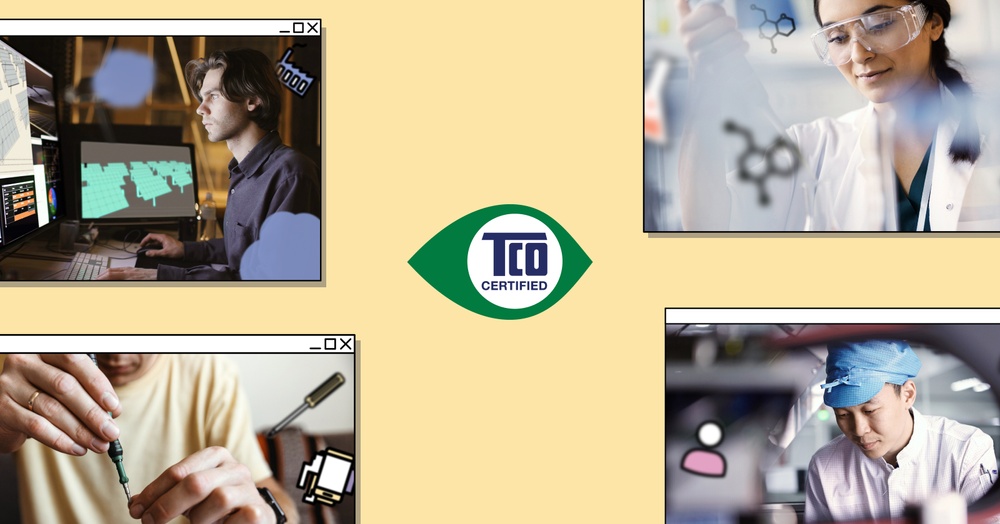TCO Certified raises ambitions for sustainable IT, empowering purchasers to drive lasting change

Updated TCO Certified criteria empower IT purchasers to drive sustainability across climate, hazardous substances, circularity, and supply chain responsibility
IT purchasers, including procurement professionals, IT managers, sustainability leaders, and policymakers, are now empowered to raise their sustainability ambitions with the updated criteria of TCO Certified, the global sustainability certification for IT products for over 30 years. The stricter criteria help purchasers to take the lead in social and environmental sustainability and reduce the climate impact of electronics by choosing responsibly designed products, verified by independent experts.
“The focus on measuring product carbon footprints has proven challenging, and also diverts attention from reducing the footprints,” says Sören Enholm, CEO of TCO Development, the organization behind TCO Certified. “TCO Certified is all about driving real change, and besides pushing for reduced product carbon footprints the updated criteria also push for longer product life and a reduction of e-waste. Choosing certified products not only reduces environmental impact but also supports ethical supply chains, giving organizations a competitive edge.”
In a world increasingly dependent on IT products, the urgency to tackle the climate crisis is greater than ever. Reducing emissions shouldn’t mean sacrificing progress—it requires smarter adaptation and continuous innovation. TCO Certified addresses this challenge across four key areas: climate, substances, circularity, and supply chain - all important issues in a new, more stringent regulatory environment - creating a link between innovative IT brands and purchasers, giving purchasers a powerful way to add their voice to a global market signal for change.
Most important criteria updates:
-
Climate: For most IT products, a majority of greenhouse gas emissions occur in the manufacturing phase. Therefore, TCO Certified uses annualized product carbon footprints to highlight the advantages of extending product use. Updated criteria extend product lifespans and improve design and manufacturing processes to cut scope 3 emissions.
-
Substances: With only 1 percent of over 350,000 chemicals in use risk-assessed, managing substances in IT products and their manufacture is crucial to reducing hazards during production and disposal. TCO Certified Accepted Substance List was launched to address this. TCO Certified Accepted Substance List now includes more safer substances, targeting stabilizers in external cables, to protect worker health in the supply chain and that hazardous substances leak into nature.
-
Circularity: In 2022, e-waste reached a record 62 million tonnes and is expected to hit 82 million by 2030. Brands must design for longevity and enable circular flows of products and materials. TCO Certified is pushing this forward by extending product lifespans with longer warranties, improved repairability and recycling, along with easier battery replacement. The goal is to reduce e-waste, boost circularity and deliver long-term cost savings for organizations.
-
Supply Chain: When tackling climate change, it's crucial not to overlook supply chain workers whose livelihoods depend on the IT industry. Despite existing labor laws, weak enforcement leaves many vulnerable. The TCO Certified system for supply chain monitoring has already improved conditions for over 200,000 workers. By expanding the active monitoring system to include display panel manufacturers, it will now impact over 100,000 additional workers, promoting safer, more responsible practices.
Driving Change Through Accountability
The updated criteria are designed to empower purchasers to actively contribute to reducing the environmental and social impacts of technology. By asking for certified products, organizations send a strong market signal for innovation and sustainability, creating a ripple effect across the global IT industry.
You can find more information about the updated criteria here.
About TCO Certified
TCO Certified is the global sustainability certification for IT products, empowering IT buyers and brands to make more responsible choices. Criteria are updated every three years and designed to drive social and environmental responsibility throughout the product life cycle. Compliance with all criteria is independently verified. TCO Certified focuses on addressing key sustainability challenges in climate, substances, circularity, and supply chain responsibility.
The organization behind TCO Certified is TCO Development. https://tcocertified.com/
PR contact
